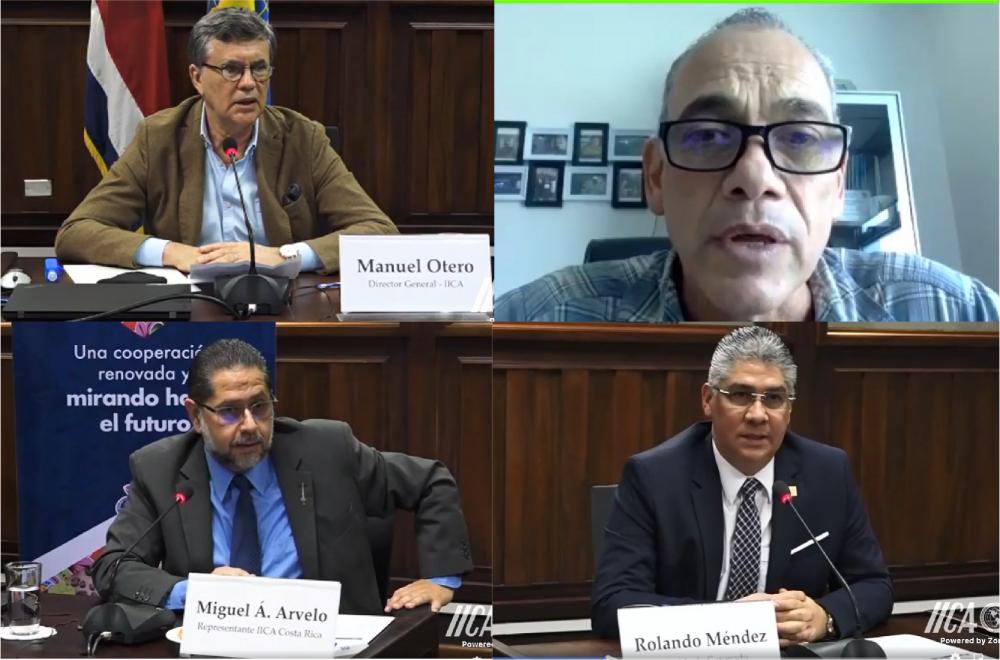Costa Rica enjoyed more than three million dollars’ worth of IICA technical cooperation in 2019-2020

San Jose, 24 November 2020 (IICA) During 2019-2020, which includes the months of the ongoing pandemic, IICA’s engaged in cooperation actions in Costa Rica for a value of more than 3 million dollars – nearly 20 times more than the country’s contribution to the hemispheric organization.
Over the last year, the Costa Rican Delegation of the Inter-American Institute for Cooperation on Agriculture (IICA) executed 17 externally funded projects and 7 policy and planning instruments; provided support to 59 partners; released 28 publications and prepared 526 farm plans to assist producers in the country.
The Institute presented this data at its annual results presentation event, which this year featured the launch of its Virtual Accountability Platform.
The hybrid face-to-face/ online event was attended by national authorities Renato Alvarado and Rodolfo Solano, the Ministers of Agriculture and Livestock as well as of External and Religious Affairs, respectively, and the Mayor of the canton of Vázquez de Coronado, Rolando Méndez.
Representing IICA were Manuel Otero, Director General, and Miguel Ángel Arvelo, IICA Representative in Costa Rica.
Alvarado pointed out that, “We must make it clear that during this era of the pandemic IICA’s support for agriculture and livestock development is even more necessary. I believe that its efforts toward development and economic recovery have been successful”.
“Furthermore”, said the Minister of Agriculture and Livestock, “We need to formulate a new vision to develop sustainable food systems with fair prices. I applaud IICA’s renewed outlook and more holistic view of agriculture and its focus on family farmers, with a strengthened outlook on the future".
Rodolfo Solano, Minister of Foreign and Religious Affairs commented that, “Over time, IICA’s work and profile has made it a highly regarded institution in the eyes of Costa Ricans. It is a benchmark organization that has developed a close relationship with the Ministry of Foreign Affairs. Some weeks ago, for example, we signed an agreement that will allow Costa Rican diplomats to participate in a wide variety of training courses”.
Manuel Otero pledged to continue with this institutional support. “These are times of crisis”, he remarked, “and the only way we will pull through is to continue working together. IICA is an institution of open doors that encourages public-private partnerships”.
To ensure continued delivery of technical cooperation of the highest quality, during 2019-2020, IICA adapted to the restrictions of the pandemic and harnessed digital information and communication technologies to assist producers, associations and government institutions.
IICA Representative in Costa Rica, Miguel Ángel Arvelo, remarked that, “We can assure you that this year the Institute has stood by those in need, despite the challenges of the pandemic, providing tools and solutions adapted to the challenges of the virtual context”.
Voices of beneficiaries
The accountability event also featured leading players in the cocoa, pineapple, coffee and livestock chains, among others, all of whom delivered video messages, thanking IICA for its cooperation actions to assist them this year.
For example, in coordination with the Costa Rican Coffee Institute (ICAFE), IICA developed tools to enable coffee producers to implement sanitary protocols and also provided technical assistance through the European Union-funded Central American Program for Integrated Coffee Rust Management (PROCAGICA).
Xinia Chávez, Executive Director of ICAFE, remarked that, “The partnership with IICA has provided significant support for us”.
“Thanks to IICA, new technologies have been developed for the agriculture sector and it has been a partner with which we have been able to devise projects to bolster technical capacities”, said Vice-Minister of Science and Technology, Federico Torres.
In the area of technology, the Institute has promoted the transition from traditional to a more technology-driven Agriculture 4.0, in the process of boosting productivity and sustainability.
This year, two rallies were held with rural women, dealing with geospatial technology and seeking, to build capacities and execute projects to boost agricultural resilience and biodiversity preservation in their communities.
IICA’s cooperation efforts included projects to benefit fine and flavor cocoa producers, through the preparation of farm and technology plans; the milk association, in the area resilience and sustainability; and the pineapple industry, through the development of technical and safety standards. The Institute also promoted ecommerce in the food industry.
Luis Diego Obando, Executive Director of the Livestock Corporation (CORFOGA), a Costa Rican non-state public entity, remarked that, “The financing program promoted by IICA has bolstered and spurred the development of the country’s livestock industry”.
An IICA of open doors
At the accountability event, Manuel Otero, Director General of IICA, thanked the Vázquez de Coronado canton, which has been home to the Institute for more than 44 years.
IICA Headquarters is based there and since 2019, the Institute has been undertaking projects with the community, with a youth focus, aiming to demonstrate how technology is modernizing agriculture and how the field can be a profitable career choice.
Efforts have also sought to increase awareness about the importance of agriculture to food production, environmental conservation and rural development.
Most notable among these projects have been the launch of the Interpretive Center for Tomorrow’s Agriculture (CIMAG), the digital innovation Fab Lab for Agriculture, the Typical Rural House, the Art and Culture mural and the AgroArt Museum of Virtual Art, all housed at IICA’s facilities.
Mayor Rolando Méndez, commented that, “We have seen the greater openness of IICA towards the community and the country. We sense that it has become closer to and more integrated into the community”. He also congratulated the Institute for its assistance to vulnerable communities during the pandemic.
This year, the Food Bank distributed food to more than 1,300 Coronado and Turrialba families on eight occasions, through an initiative of IICA and the Tropical Agricultural Research and Higher Education Center (CATIE), with support from EU projects.
Videos:
More information:
Institutional Communication Division
comunicación.institucional@iica.int
Miguel Á, Arvelo, Chief of Staff and IICA Representative in Costa Rica.